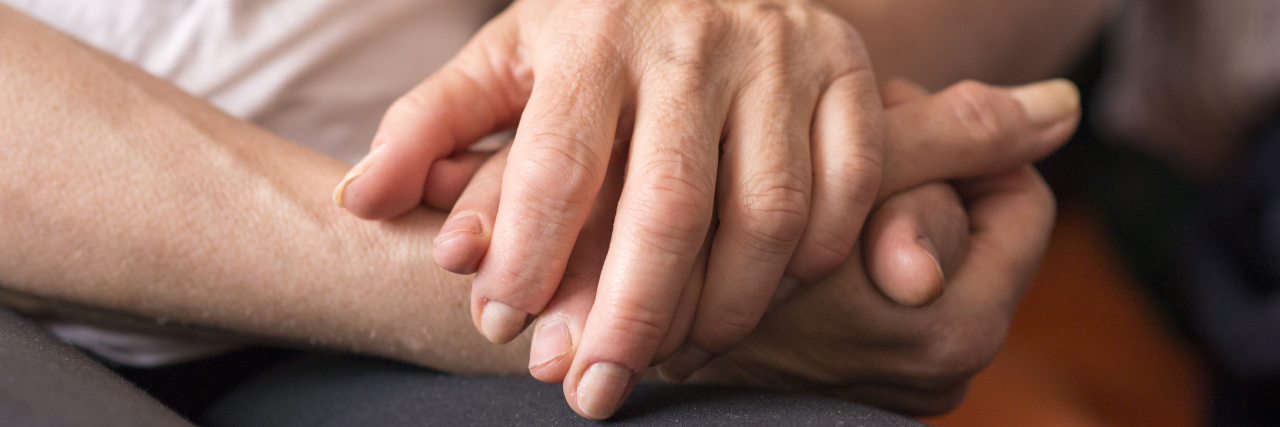What I've Learned Since My Husband's Stroke
Editor's Note
Need to take your mind off what you’re going through? Join the Distract Me group on The Mighty.
“Hello, this is the nurse at the orthopedic hospital. Early this morning your husband had a neurological problem develop …”
“Has he had a stroke?”
“Yes, ma’am.”
“I’m leaving now.”
And our life turned upside-down.
We don’t get to choose all of the cards we are dealt in life. We do choose how we play them. Both divorced and in our 50s, we found ourselves rebuilding our lives. My long-held plans ended five years earlier when my ex abandoned our marriage and our children. He was sorting out his life in wake of a dead marriage. We started a new life together. He loved me and my two teens as he did his own daughters.
Long-term back pain worsened and his surgeon recommended fusion surgery. This strong, active man persevered through all they threw at him—physical therapies, pain, medications, and injections—with fervor and without complaint. The back pain returned. The orthopedic recommended another fusion procedure. We should be in and out of the hospital in 48 hours. I would stay nearby with my girlfriend, Gloria. Twelve hours after the surgery, he had a “small to medium, middle cerebral artery (MCA), ischemic stroke on the left side with expressive aphasia and apraxia.” Gloria grabbed my hands and said a quick prayer for his recovery before I hurried out the door.
He spent a month in the hospital. And thus began our learning how to play this latest hand we’d been dealt. Those weeks in the hospital were an eye-opening experience for both of us. Many of our preconceived thoughts and expectations of the medical community were tossed on end. I thought, “Strokes aren’t new. They’ll know what to do, what we’re to expect.” But … no. The brain is a massive pile of little gray cells. Every stroke touches on different cells even if they’re very near each other. Suppose they were all numbered. My stroke may happen on cells 1000-2000. Your stroke, same size as mine, same area as mine, but cells 1500-2500 are damaged. So we will each have similar and different deficits from the stroke.
That was the first thing we learned. They cannot tell you with certainty when or if you’ll recover. He was an aggressive participant in his recovery. He never gave up. Attitude and perseverance play a huge role in recovery. He’d had serious back surgery the day before the stroke. It was listed on his charts. I’d written it on the whiteboard in each hospital room. I told anyone who entered his room. I was continually amazed that no one seemed to know. Many times I would arrive during PT to find the therapist did not know of the surgery. “Did you read his chart? Or here, written on the board?” It happened many, many times.
That was the second thing I learned, never assume they know more than you. One medical professional told me he’d be fit as a fiddle in three months. Another said, “He’ll never be the same man again.” Both were wrong. I knew my husband. We needed their help, but I knew him best. He came home four weeks after his surgery. Home Health scheduled physical therapy, occupational therapy, and speech therapy. We were both on my employer’s health insurance. He, and many stroke survivors (SS), will need therapy for years. Most insurance pays for a limited number of visits. It won’t be enough.
The third thing I learned was to keep records. Take notes on everything. Dates, times, names, locations, events. Record the visits to his room by the medical professionals, what was said or done. Make notes of your SS’s blood pressure, weight, any falls, nausea, dizziness, diet, alcohol/tobacco consumed, and on and on. And your questions.
We must learn as much as possible. We cannot wait for the medical community to initiate his therapy. I Googled. I watched YouTube videos. I read books. I joined FB pages. You must become your own advocate. He took ownership of his therapy. But healing is slow. We live in a high-tech world. If something breaks, we toss it and buy another. Our bodies are complex low-tech beings. We must be patient, yet not complacent. We must gauge our recovery not in days, but in seasons, “Do I feel better at Easter than last Christmas?” Make videos. Take pictures. Anything to show your stroke survivor that they are improving. Everything for encouragement. The memory is fuzzy. Life is overwhelming and in three or four months you may forget just how far your SS has come. It is now about 18 months since his stroke. He’s still improving. Life is different, but he’s still the man I married.
Getty image by ljubaphoto

